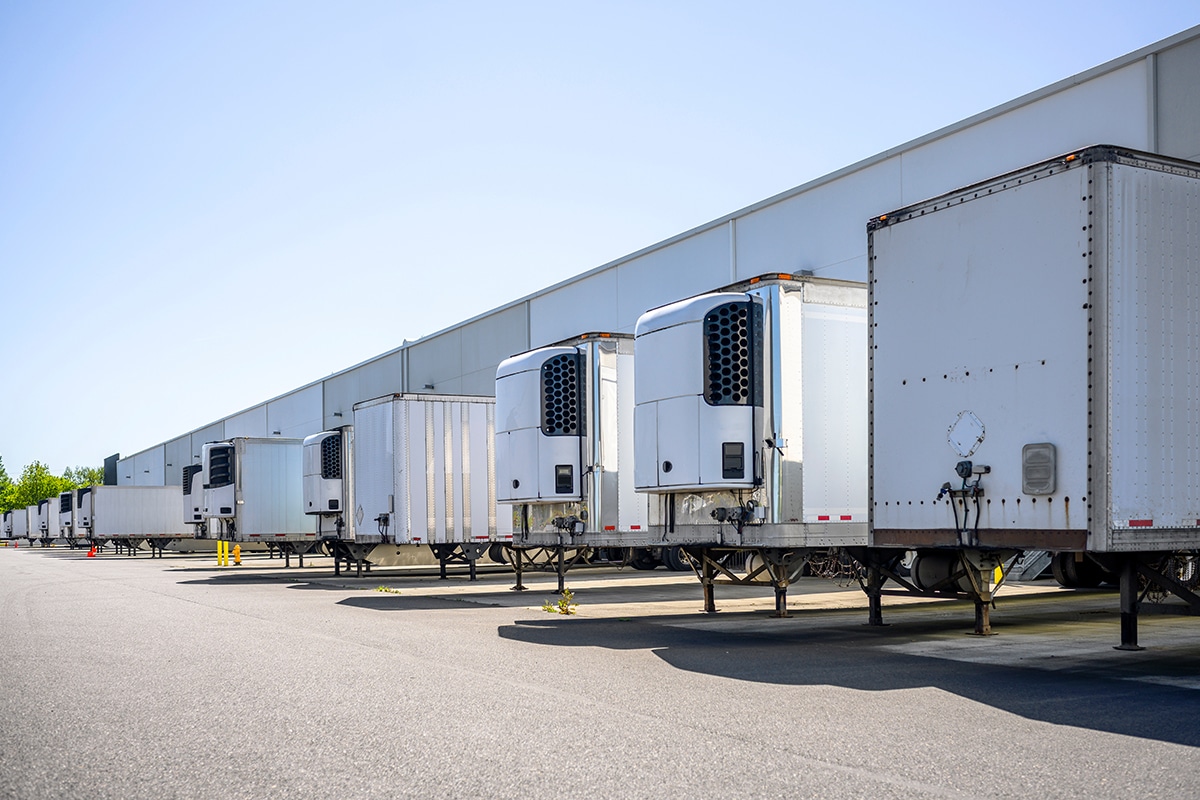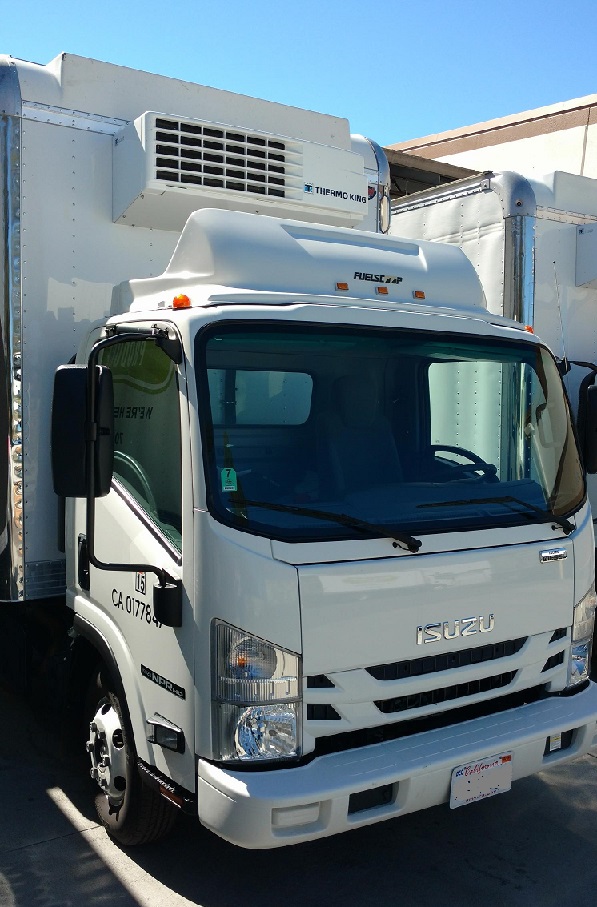Refrigerated Transportation Thermo King: Maintaining Goods Fresh in Transit
Refrigerated Transportation Thermo King: Maintaining Goods Fresh in Transit
Blog Article
Top Innovations in Transport Refrigeration: Enhancing Efficiency and Safety And Security
The landscape of transportation refrigeration is undergoing considerable change, driven by technologies focused on enhancing both performance and safety and security. Trick innovations such as smart temperature tracking systems, environment-friendly cooling agents, and automated course optimization are essential in resolving the market's obstacles. These modern technologies not only guarantee the integrity of temperature-sensitive items however also add to sustainability efforts. As these technologies proceed to progress, it is essential to discover their ramifications on operational techniques and regulatory compliance, motivating a closer exam of exactly how they reshape the future of transportation refrigeration.
Smart Temperature Level Keeping An Eye On Equipments
In the realm of transport refrigeration, smart temperature level monitoring systems have actually arised as a vital innovation for making sure the stability of temperature-sensitive products. These advanced systems take advantage of Internet of Points (IoT) innovation to give real-time information on temperature fluctuations, enabling drivers to preserve optimal problems throughout the supply chain. By continuously tracking the temperature level of refrigerated containers and automobiles, business can quickly recognize discrepancies that might jeopardize product top quality.

Moreover, smart tracking systems often integrate automated informs and notices, permitting stakeholders to respond without delay to any kind of potential problems. This positive approach not only reduces the risk of wasting however additionally boosts conformity with regulative requirements controling food security and pharmaceutical transportation.
The assimilation of data analytics within these systems additionally promotes anticipating upkeep, aiding drivers to visualize possible tools failings before they happen. This ability minimizes downtime and enhances operational effectiveness, inevitably bring about set you back financial savings.
Eco-Friendly Refrigerants
Smart temperature level monitoring systems play an essential duty in keeping product quality, yet the effectiveness of transportation refrigeration additionally rests on the choice of cooling agents made use of. As environmental issues increase, the change towards environmentally friendly refrigerants has actually become crucial. Traditional refrigerants, such as hydrofluorocarbons (HFCs), are notorious for their high Global Warming Prospective (GWP), contributing considerably to environment adjustment. In comparison, arising options like hydrocarbon-based cooling agents and hydrofluoroolefins (HFOs) present reduced GWP choices, providing both effectiveness and sustainability.
These environmentally friendly refrigerants not only reduce ecological impact yet additionally align with worldwide policies intended at eliminating hazardous materials. Their fostering can cause improved energy performance, inevitably reducing operating expenses for transportation refrigeration systems. Furthermore, the usage of natural cooling agents, such as ammonia and carbon dioxide, has obtained grip because of their exceptional thermodynamic residential or commercial properties and lower environmental impact.
Purchasing eco-friendly cooling agents is not just a regulatory conformity procedure; it represents a critical decision that improves brand online reputation and fosters customer commitment. refrigerated transportation thermo king. By prioritizing sustainable techniques, firms can contribute to a greener future while making certain the integrity of carried items
Advanced Insulation Materials
Using sophisticated insulation products is crucial for maximizing transport refrigeration systems, as they considerably boost energy performance and keep regular temperature level control. Conventional insulation approaches often fall short in stopping thermal transfer, bring about increased power intake and varying temperatures within refrigerated compartments.
Arising materials such as vacuum cleaner protected panels (VIPs) and aerogels provide superior thermal resistance, enabling thinner accounts without jeopardizing performance. VIPs, for example, use a vacuum layer to minimize conductive and convective warmth transfer, making them perfect for space-constrained applications. Aerogels, understood for their lightweight and porous structure, provide outstanding insulation while considerably minimizing general system weight.
Furthermore, including stage modification materials (PCMs) into insulation systems can better maintain temperatures throughout transportation. These materials soak up and launch thermal energy, properly buffering versus outside temperature variants.
The integration of these sophisticated insulation materials not just decreases the functional costs linked with energy consumption however additionally expands the life span of temperature-sensitive goods. As the transportation refrigeration industry remains to advance, the adoption of innovative insulation innovations will certainly be pivotal in boosting both efficiency and security in chilled transportation.
Automated Path Optimization
The performance of transportation refrigeration systems is substantially enhanced through automated route optimization, which leverages advanced formulas and real-time data to establish one of the most reliable paths for shipment. By assessing various aspects such as website traffic patterns, weather conditions, and shipment home windows, these systems can substantially decrease traveling time and fuel intake.
Automated route optimization minimizes human mistake and subjective decision-making, which can result in inefficiencies. This innovation enables fleet managers to assign sources more successfully, guaranteeing that chilled products maintain their required temperature throughout the journey. By optimizing paths, firms can likewise improve client fulfillment through prompt shipments.
Furthermore, automated systems can adjust to unforeseen scenarios, such as road closures or abrupt traffic spikes, permitting dynamic rerouting. This versatility not just secures the integrity of temperature-sensitive items but likewise adds to total functional effectiveness.
Implementing automated course optimization can lead to substantial price financial savings while lowering the carbon footprint connected with transport. As businesses increasingly focus on sustainability, this technology stands apart as a crucial part in modern transport refrigeration, aligning operational objectives with ecological obligation. Inevitably, automated route optimization stands for a substantial development in the quest for performance and safety and security in transport refrigeration.

Real-Time Data Analytics
Automated route optimization considerably take advantage of the integration of real-time information analytics, which offers crucial insights right into the efficiency of transport refrigeration systems. By utilizing real-time information, transport drivers can check these guys out monitor temperature variations and tools performance, making certain that subject to spoiling items are maintained within needed specifications throughout transit. This positive strategy not just enhances the high quality of the transferred products yet likewise mitigates the danger of putridity and loss.

In enhancement to improving efficiency, real-time analytics enhances security by making certain compliance with regulatory standards for temperature control. This not just safeguards public wellness but likewise fortifies a business's online reputation - reefer trucks thermo king. As the transportation refrigeration industry progresses, the assimilation of real-time data analytics becomes a keystone for driving technology, sustainability, and operational excellence
Final Thought
To conclude, my site the innovations in transportation refrigeration substantially improve both effectiveness and safety and security within the market. Smart temperature level surveillance systems and real-time information analytics provide vital oversight, while eco-friendly cooling agents and progressed insulation materials add to sustainability and energy performance. Furthermore, automated path optimization algorithms not just reduce travel time but also reduce environmental influence. Collectively, these technologies stand for a vital evolution in transport refrigeration, guaranteeing conformity with governing standards and advertising a greener future.
The landscape of transport refrigeration is going through considerable change, driven by advancements aimed at improving both effectiveness and security.Smart temperature level monitoring systems play an essential function in preserving item quality, yet the performance of transportation refrigeration likewise hinges on the option of refrigerants made use of. Their adoption can lead to improved power efficiency, ultimately reducing operating expenses for transportation refrigeration systems. Ultimately, automated course optimization stands for a significant innovation in the pursuit for look at here efficiency and safety and security in transportation refrigeration.
In final thought, the developments in transportation refrigeration substantially improve both effectiveness and safety within the market.
Report this page